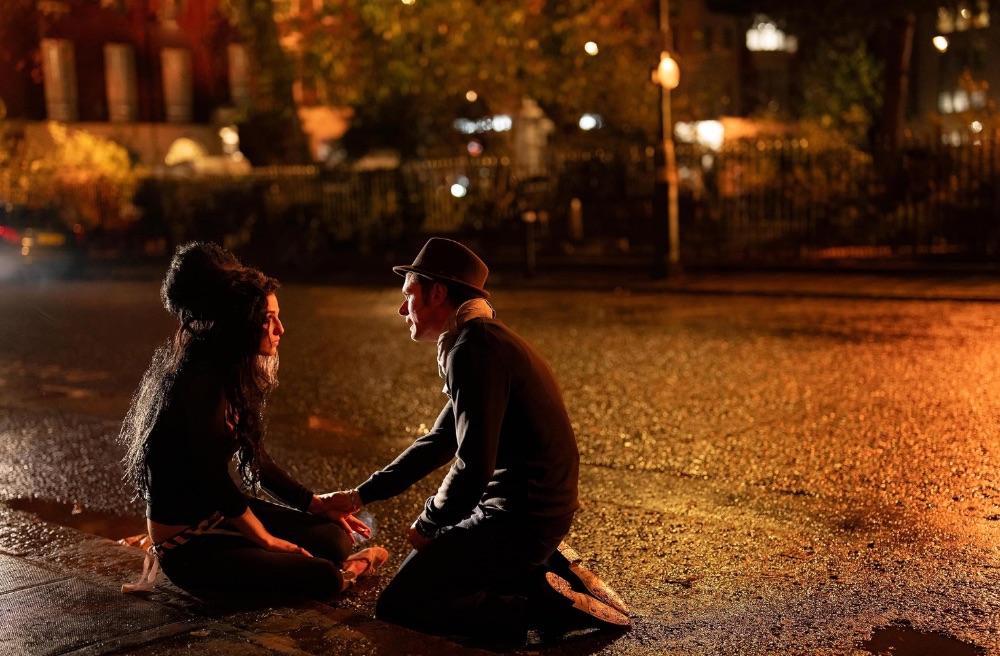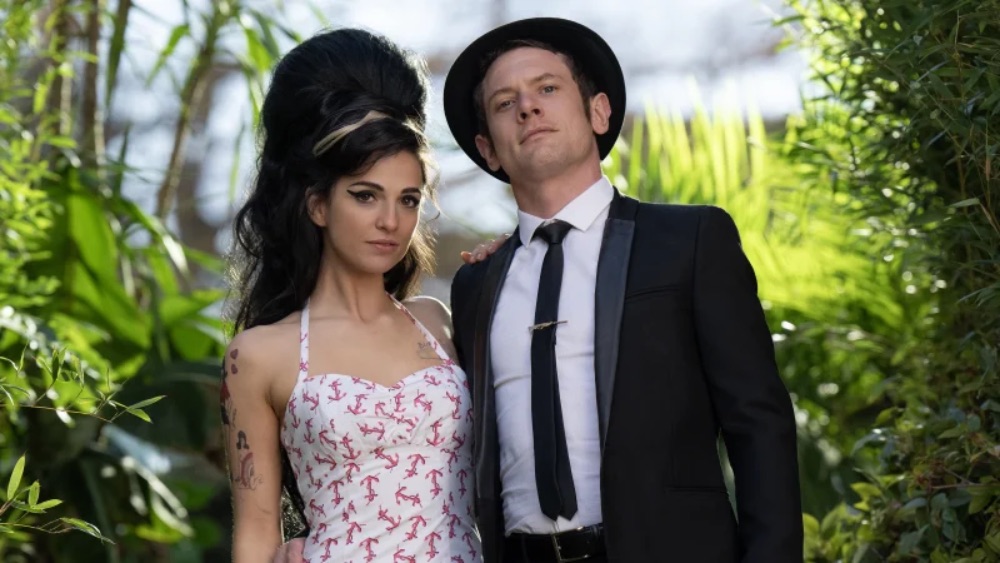Amy Winehouse was one of the most original musical artists of the 21st century, and probably back through to the latter half of the 20th century as well. Her music was raw and real and full of pain and rage; it crossed the genres of jazz and soul, R&B and reggae, and yet still managed to be as popular, as, well, modern pop. She was as wild and as wise as her music; she exuded a feral sexual energy and embodied all the anger of smart, ambitious, talented women in a world that, if it is able to appreciate such women at all, can only do so if it can corral them and tame them and commodify them.
The brilliant Oscar-winning 2015 documentary Amy, by filmmaker Asif Kapadia, captures Winehouse in all her glorious, damaged, unclassifiable, irrepressible messiness.
The tepid, perfunctory Back to Black — from director Sam Taylor-Johnson (Fifty Shades of Grey, Nowhere Boy) and screenwriter Matt Greenhalgh — does not.

If you aren’t already familiar with Winehouse’s body of work, Black won’t do much to clue you in. If you are already familiar with her music, you will likely spend much of the film’s runtime wondering just when “Rehab” — perhaps her most famous song apart from the one the movie is named for — will make its appearance.
Because that’s what Winehouse was about, wasn’t she? *rolls eyes* She died from alcohol poisoning in 2011, aged only 27, after a too-brief life of substance abuse, bulimia, and likely undiagnosed mental illness. She made some music in there, too, of course, which earned her a shit-ton of major awards: Grammys, Ivor Novellos, NMEs, and others. But if you were gauging from this lazy, even cowardly recounting of her life, Winehouse was mostly just a sad young woman who longed for babies and an utterly conventional, afeminist life. And for sure, none of the toxic men in her life were in any way to blame for her tragedy. *rolls eyes harder*
I’m slightly consoling myself about the disappointment of this movie by imagining the blazingly furious song Winehouse would have written about her life and work and genius being diminished like this.

There’s a scene very early in Black, a long uncut one in which the teenaged Winehouse sits on her bed writing a song, strumming chords on her guitar as tries out lyrics. For all that those lyrics are complicated and confounding, the segment is gentle and sweet and honest about illustrating a young woman’s angst while also capturing the electricity of Winehouse’s creativity: I don’t know if her songwriting was actually as effortless as is depicted in this moment, but it’s a beautiful cinematic snapshot of the lightning-in-a-bottle imagination that Winehouse’s music sang with, pun intended.
But Back to Black never reaches that height of incisive portraiture again. British actor Marisa Abela, in her first starring role, is very very good as Winehouse — she’s the film’s one saving grace — but if she, doing her own vocals here, can’t quite achieve Winehouse’s bleak ache, well, that’s as much a testament to the uniqueness of the real Winehouse’s voice as it is a laudable attempt on Abela’s part.
If only the movie around Abela was worthy of her efforts. There are a few tender moments limning the relationship between Winehouse and her paternal grandmother, Cynthia (Lesley Manville: Mrs Harris Goes to Paris, Ordinary Love), a former jazz singer with whom Winehouse shared a clear affinity. But beyond this, Greenhalgh’s shallow script lacks any authentic understanding of the pressures on women — not just Winehouse — to conform, either in our personal lives or professionally: he can put a line of dialogue like “I ain’t no fucking Spice Girl” in Winehouse’s mouth, but he doesn’t seem to know how to depict what that would have meant for a popular female recording artist in the 2000s. I mean, I get that: it’s hard! There’s no easy cultural playbook for examining how women get shafted in our world. But that’s what a movie like this one should be at least trying to figure out how to portray.

It’s almost as if Back to Black, for all that it is presumptively about Amy Winehouse, doesn’t actually know what to do with her: if she was this much of a personal disaster, it must be because she wanted an ordinary life – even if absolutely all public evidence is to the contrary — and couldn’t manage that? There’s a long sequence in which she goes on a first date with Blake Fielder-Civil (Jack O’Connell: Seberg, Trial by Fire) — the man who would later introduce her to crack cocaine — to the London Zoo, and she ends up using the example of a lioness and her cubs to tell him — a man she has just met — about all the many children she wants to have. Later, another scene depicts her having a breakdown over a negative pregnancy test. (The movie is very coy about her bulimia, but it seems unlikely that the distressingly thin Winehouse could have even gotten pregnant in the first place, which she must have been aware of. Meanwhile, Abela-as-Amy is also distressingly thin… and in a film that genuinely wanted to grapple with the bullshit our society puts women through, especially women in the public eye, there would be a helluva lot more self-awareness about this.)
Winehouse had massive public breakdowns in her final years, which scuppered concerts and were noticed by her fans. Even people who didn’t know her personally knew she wasn’t well, but none of that is depicted here. There are a few scenes in which she stumbles through performances, and I wondered: What does her backup band think of this? What do they think of her obvious precariousness? Did they try to help her? But they are not characters here at all. Though we do get a scene in which her father and hanger-on, Mitch (Eddie Marsan: The Gentlemen, Hobbs & Shaw), does say, “I think she’s fine,” and hence doesn’t need to go to rehab, a painfully on-the-nose and utterly unironic reference to a lyric in “Rehab.” But she’s clearly not fine, and Black lets him off the hook just as it does Fielder-Civil. Appallingly, Back to Black hangs its subject out to dry just as the people closest to her in her life did, too.
more films like this:
• Funny Cow [Prime US | Prime UK | Apple TV UK]
• Walk the Line [Prime US | Prime UK | Apple TV | Hulu US | Disney+ UK]
























